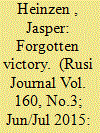| Srl | Item |
| 1 |
ID:
139333


|
|
|
|
|
| Summary/Abstract |
Waterloo has always been overshadowed by the 1813 Battle of Leipzig in German national memory. Given the salient contribution of Prussian, Hanoverian, Brunswick and Nassau troops to the final victory over Napoleon, this reticence may at first glance seem surprising. Jasper Heinzen contends that Waterloo failed to become a symbol of national achievement in the nineteenth century because of the regional and political fissures it laid bare. If the First World War produced a consensus at last, the price was a subversion of the Anglo-German comradeship so integral to the original event. The resulting mnemonic distortions and, since the Second World War, Franco-German partnership have served to keep Waterloo on the sidelines, yet the battle still holds important lessons for policy-makers today.
|
|
|
|
|
|
|
|
|
|
|
|
|
|
|
|
| 2 |
ID:
139332


|
|
|
|
|
| Summary/Abstract |
The Battle of Waterloo marked the end of a protracted European conflict that had lasted for twenty-three years. This period witnessed the seemingly inexorable rise of Napoleon, first to the position of general, then consul and finally emperor. It saw him face several kaleidoscopic coalitions of European powers, experience victory and defeat in battle, suffer exile, and return to rally France once again during the famous Hundred Days that ended at Waterloo. The question as to why this most famous of military strategists was defeated in June 1815 has long been a source of debate. Here, Beatrice Heuser explores the reasons why he lost the battle and – ultimately – the war, concluding that this was due to a broader failure of strategic vision on Napoleon's part.
|
|
|
|
|
|
|
|
|
|
|
|
|
|
|
|
| 3 |
ID:
139334


|
|
|
|
|
| Summary/Abstract |
By bringing the Napoleonic Wars to an end, the Battle of Waterloo gave the last impetus to an ongoing upheaval that, in little over a decade, dislocated a centuries-old global Iberian world. To a limited extent, it also contributed to the unleashing of an era of civil war that resulted in the secession of most of the Spanish American dominions and fuelled the ideological battleground between conservative and progressive, centralist and decentralist forces. Portugal fared no better, troubled by domestic crises and the eventual unravelling of the Lusitanian Empire through the emergence of an independent Brazil.
|
|
|
|
|
|
|
|
|
|
|
|
|
|
|
|
| 4 |
ID:
156673


|
|
|
|
|
| Summary/Abstract |
In this article, I analyze the use of historical counterfactuals in the Campaign of 1815 by Carl von Clausewitz (1780–1831). Such is the importance of counterfactuals in this work that its gist can be given in a series of 25 counterfactuals. I claim that a central role is played by evaluative counterfactuals. This specific form of counterfactuals is part of a didactic method that allows Clausewitz to teach young officers a critical method that prepares them for the challenge of decision-making in real warfare. I conclude with the enduring relevance of Clausewitz’s use of evaluative counterfactuals for contemporary military historiography.
|
|
|
|
|
|
|
|
|
|
|
|
|
|
|
|